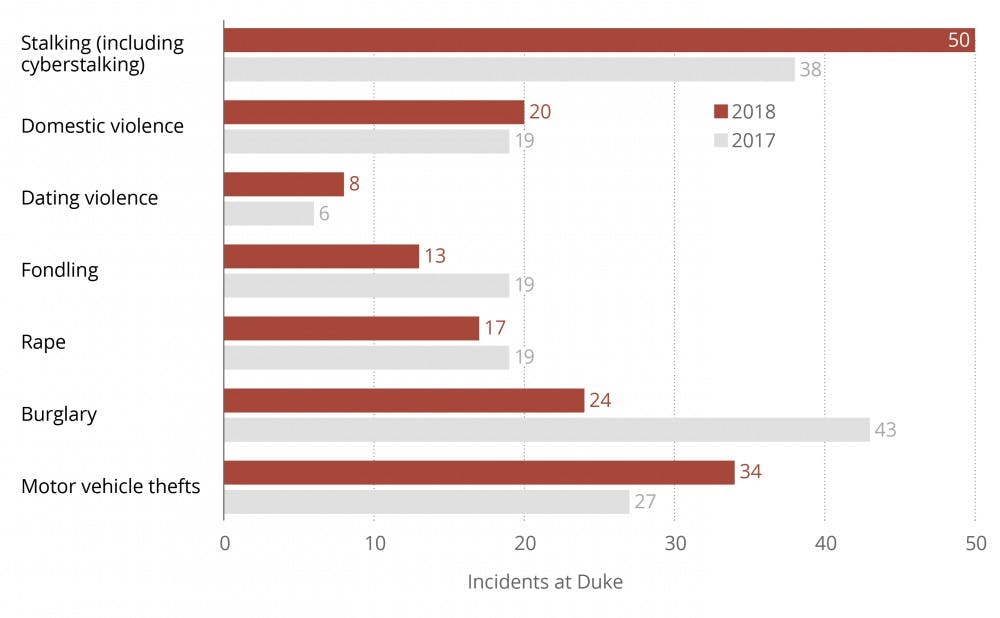Violence Against Women Act crimes rose at Duke, according to the 2019 Annual Clery Security Report, but administration questioned if the increase is due to a greater frequency of reports.
The report revealed Violence Against Women Act offenses—stalking, domestic violence and dating violence—on Duke’s campus rising between 2017 and 2018. The report includes crime statistics from 2016 to 2018 compiled from campus police and security, local law enforcement and University officials responsible for student and campus activities.
Crimes are categorized in the report based on the year they were reported, not when they occurred.
Reports of stalking and cyberstalking, which had increased significantly from 16 reports in 2016 to 38 in 2017, jumped to 50 reports in 2018. Stalking in a residential facility accounted for only 15 of the 42 total on-campus stalking offenses that were reported last year.
Cyberstalking comprised the majority of the reported stalking incidents and were either employee- or visitor-related, Vice President for Administration Kyle Cavanaugh wrote in an email to The Chronicle.
“Given that these are new areas of reporting, we are continuing to evaluate whether there is a true increase or that people are simply reporting more frequently,” he wrote.
The report also showed a marked decrease in campus burglaries, from 43 in 2017 to 24 in 2018. Motor vehicle thefts between the two years increased from 27 to 34.
Cavanaugh added that almost all of the reported burglary incidents were in administrative office areas.
“The arrest of an individual for some of these contributed to the decrease [in burglaries],” he wrote. “Increased staffing and the deployment of additional cameras have also contributed.”
The number of liquor law arrests increased from two in 2016 and zero in 2017 to five in 2018, yet reports of liquor law violations referred decreased dramatically from 329 to 268.
Most of the liquor law violation referrals involve a report from a resident assistant when there has been a policy violation, and there are often “fluctuations from year to year,” Cavanaugh explained.
From 2017 to 2018, incidents of drug law arrests increased from nine to 15 and drug law violations referred went up from 79 to 84. Illegal weapons possession arrests increased from one to eight.
Cavanaugh wrote that ensuring safety and security at Duke is a “constantly evolving effort.” Specifically, 2018 saw improvements in additional security cameras across the University, additional staffing, the expansion of the LiveSafe app and increased numbers of tabletop drills to discuss emergency response.
“There is literally a daily effort to always be seeking what can we improve to sustain as safe an environment as possible. Efforts will continue in constantly looking at emerging risks and ensuring we have the best mitigation strategies possible,” Cavanaugh wrote, regarding the future of safety and security at Duke.
Furthermore, incidents of domestic violence rose slightly from 19 reports in 2017 to 20 in 2018, and reports of dating violence grew from six to eight.
Compared to 2017, there were six fewer fondling reports and two fewer rape reports recorded in 2018.
Ultimately, Cavanaugh emphasized that the report, which represents efforts across Duke to mitigate risk and promote a safe environment, reflects “a continued strong commitment from all in the Duke community to that shared responsibility.”
The same data for the Duke University Marine Lab—which had no reported crimes in 2018—and Duke in DC program—which featured two liquor law arrests and one illegal weapons possession arrests—is included in the report as well.
The Clery Security Report details crime reporting procedures, emergency notification systems, student rights, resources and crime prevention programs in addition to crime statistics.
In addition to the annual report, the Duke University Police Department provides daily and weekly crime summaries, which are available publicly on DUPD’s website.
Get The Chronicle straight to your inbox
Signup for our weekly newsletter. Cancel at any time.

Mona Tong is a Trinity senior and director of diversity, equity and inclusion analytics for The Chronicle's 117th volume. She was previously news editor for Volume 116.

